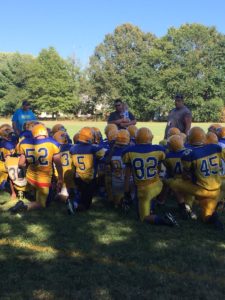Ten Ways Coaching Helps in the Classroom
Rodel Teacher Council member Jared Lelito teaches math in an inclusion classroom at Fred Fifer III Middle School in the Caesar Rodney School District. In addition to teaching, Jared coaches football, basketball, and baseball for the Caesar Rodney High School Riders.
During his time in the Caesar Rodney School District, Lelito discovered a few ways coaching has helped improve his teaching in the classroom. Here are just a few.
- Builds Rapport
Some teachers spend roughly an hour with their students five times a week. Coaches, on the other hand, may spend upward of 15 to 20 hours a week with their student-athletes. The sheer amount of time spent together builds a rapport and fosters comradery. I find that players who are willing to give 100 percent on the field will also give their coaches 100 percent in the classroom.
- Improves Communication
All coaches give a multitude of verbal and nonverbal commands. Baseball coaches give signals, football coaches speak jargon, and basketball coaches use dry-erase boards. Variance in communication is the key for coaches, and helps educators diversify their own classroom communication skills. - Helps Determine Style of Learning
Students don’t all learn the same way and neither do athletes. For instance, Phil can’t understand the play until he sees it taking place on the field, while Jack needs the play diagrammed on paper. Coaches develop a mixed bag a teaching styles for the field and can also use the same strategy in their classrooms. Students benefit from an educator who employs a variety of teaching methods.
- Reveals Responses to Discipline
It is no secret that coaches often “talk loudly” during practices and games. While some athletes do respond to verbal aggression, others aren’t motivated by yelling, screaming, and shouting irrationally. Coaches can quickly decipher how their players and their students will react to different styles of motivators.
- Focuses on a Common Goal
Anyone involved in sports knows that a long season requires a ton of focus. As a coach, you may lose a game to a rival school but still make the playoffs. Similar situations occur in the classroom. Teachers have to not only focus on the unit being taught but the course as a whole. Even if a lesson goes awry, good teachers and coaches keep their eyes on the big-picture goals.
- Drives Competitiveness
Athletics drives competition. Competitive students on the field often become competitive in the classroom, and healthy competition can motivate students to push each other to succeed. “How many points did you score in the game last night?” can turn into questions like, “I got a B+ on the science exam, how’d you do?” The drive that a student-athlete needs to be the best on the playing field often translates into the classroom.
- Creates a Sense of Community
Coaches stress being active community members. Whether the student-athletes know it or not, they are role models in their community, especially to younger classmates. Community involvement can instill a sense of commitment that allows the players to feel like a larger part of their school, their school district, and their neighborhoods.
- Begins a Life Long Bond
Any athlete will remember the game when the coach put him in the right position to score the game-winning bucket. He could be 70 years old and still remember it like it was yesterday. Coaches and athletes create a bond that that can continue even after the season ends and the class is dismissed.
- Prepares Students for their Future
A coach can be one of the greatest advocates for student-athletes pursuing a sport at the collegiate level and achieving success after high school. Coaches monitor grades, run study halls, and coordinate with other teachers to ensure their athletes are working hard in the classroom. The carrot of an athletic scholarship can motivate athletes to succeed on the field and in the classroom.
- Shows a Fun and Genuine Side
Coaches are different people on the field. When the competitive juices start flowing, coaches, like athletes, often take on alter egos. Athletes see their coach in a different light and may start to see him as a little more “human.” And humanizing on the sideline often leads to respect in the classroom.


